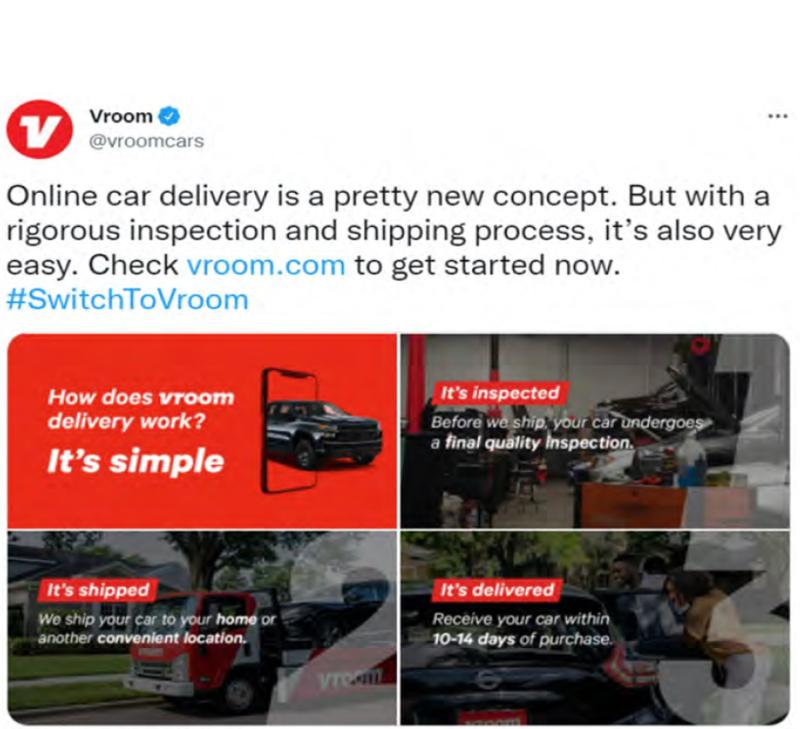“I was online shopping, but you let me down.
I was looking for the nicest set of wheels around.
You promised to deliver, but it showed up late.
And the car that you sold me – well, it’s not so great.
It’s my little used coupe. Now I’m stuck with what I got.”
With apologies to the Beach Boys’ “Little Deuce Coupe,” when used car shopping these days, many consumers are more likely to hit the screens than hit the streets. The FTC’s proposed $1 million settlement with Texas-based Vroom, Inc., charges that many consumers got less than they bargained for when they bought a used car from Vroom – and they got it later than promised.
Since 2019, Vroom has sold more than 170,000 used vehicles to consumers across the United States. Through its website and in TV and online ads, the company has invited car shoppers to “explore the thousands of high-quality, low-mileage vehicles” available through Vroom. For consumers concerned about buying a car without kicking the tires, Vroom eased their apprehensions with the promise that vehicles “undergo an extensive inspection and reconditioning process that must meet specific mechanical, electrical and cosmetic standards” and that “all vehicles pass a thorough inspection . . . so you can feel confident you’re getting a good ride.” What’s more, on a webpage titled “What is involved in Vroom’s inspection and reconditioning process?” the company got specific by identifying 184 standard inspection items.
But despite those assurances, the FTC says that in numerous instances, Vroom didn’t complete the promised inspection process before listing certain vehicles on its website and selling them to consumers. Reports from buyers to government agencies and the Better Business Bureau recount experiences with worn brakes, broken tail lights, bald tires, rusted rotors, and cars sold with the illuminated “check engine” light left unresolved.

The FTC says Vroom also fell short on its delivery representations. For example, in social media ads Vroom assured consumers they would “receive [their] car within 10-14 days of purchase.” According to an Instagram video, “When your vehicle is on its way, we’ll email you with an expected delivery date” and that consumers won’t have to wait long because “most cars are delivered within 14 days.” But according to the complaint, in many cases, Vroom failed to ship or deliver consumers’ vehicles within the advertised timeframe, with some consumers having to wait “more than 30, 60, or even 90 days or more from the date of purchase for their promised vehicles to be shipped or delivered.” The upshot: wasted time, considerable inconvenience, and added expense for consumers who had to spend hours on the phone and additional cash for alternate transportation while waiting for their Vroom purchase.
The complaint also alleges that Vroom has violated multiple FTC rules. For example, the Used Car Rule requires dealers to prominently and conspicuously display a Buyers Guide. Although Vroom included the Buyers Guide as part of the deal package sent to consumers, that didn’t happen until after the person had selected the used vehicle to buy, provided personal documents and information, and paid a deposit. And the FTC says the Buyers Guides some consumers received didn’t include specific information the Rule requires.
The lawsuit also challenges Vroom’s warranty disclosure practices. Although the company has advertised that all its vehicles come with a limited warranty good for “90 days or 6,000 miles,” the FTC says Vroom failed to meet the disclosure requirements of the Pre-Sale Availability of Written Warranty Terms Rule. As a result, the complaint alleges that many consumers weren’t able to see and understand of the terms of Vroom’s warranty, which included numerous limitations, until they were well into the purchasing process and had paid a deposit.
What about those broken promises that consumers will get their vehicle “within 10-14 days of purchase”? The Mail, Internet, Or Telephone Order Merchandise Rule requires that sellers have a reasonable basis to expect they will be able to ship either “within that time clearly and conspicuously stated” or “if no time is clearly and conspicuously stated, within thirty days after receipt of a properly completed order from the buyer.” If it turns out the seller can’t meet that timeline, the seller must give consumers the chance either to consent to a later date or to cancel their purchase and get a prompt refund. These provisions are the ones the FTC says Vroom violated.
Among other things, the proposed settlement prohibits the company from making misleading inspection and shipment claims, mandates future rule compliance, and requires Vroom to pay $1 million that will be used to provide refunds to consumers harmed by the company’s illegal practices.
Looking for compliance advice for your business? Here are some titles to add to your reading list:

They violated the CAN SPAM act as well as I never used their site nor consented to emails but I got many emails that they can sell my car.
Had the worst experience with this company for a car that had a slight crack in the windshield two seat belt buckles were broken and the sun roof would not close when opened there is a tick in the engine when contacting the company they said we had to pay to fix it all and they would refund us 30 percent but we had to have it done within 14 days which was impossible. We had already waited for over a month for the car to be delivered we then asked if we could return the vehicle and were told no. Additionally the car is now about to be repossessed as I found out there is a high chance that the financing company (united auto credit) might not even have the title. Also my interest rates are higher than what I was quoted so I will be paying over 60,000 for a car that was listed as 23,000 extremely not happy